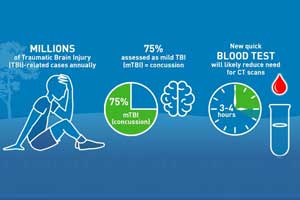- Home
- Editorial
- News
- Practice Guidelines
- Anesthesiology Guidelines
- Cancer Guidelines
- Cardiac Sciences Guidelines
- Critical Care Guidelines
- Dentistry Guidelines
- Dermatology Guidelines
- Diabetes and Endo Guidelines
- Diagnostics Guidelines
- ENT Guidelines
- Featured Practice Guidelines
- Gastroenterology Guidelines
- Geriatrics Guidelines
- Medicine Guidelines
- Nephrology Guidelines
- Neurosciences Guidelines
- Obs and Gynae Guidelines
- Ophthalmology Guidelines
- Orthopaedics Guidelines
- Paediatrics Guidelines
- Psychiatry Guidelines
- Pulmonology Guidelines
- Radiology Guidelines
- Surgery Guidelines
- Urology Guidelines
First blood test which evaluates concussion in adults

The U.S. Food and Drug Administration has approved first blood test to evaluate concussion in adults. After reviewing thoroughly the regulator has approved device Banyan Brain Trauma Indicator in part of its Breakthrough Devices Program. Availability of a blood test for concussion will help healthcare professionals determine the need for a CT scan in patients suspected of having mTBI and help prevent unnecessary neuroimaging and associated radiation exposure to patients.
Most patients with a suspected head injury are examined using a neurological scale, called the 15-point Glasgow Coma Scale, followed by a computed tomography or CT scan of the head to detect brain tissue damage, or intracranial lesions, that may require treatment; however, a majority of patients evaluated for mTBI/concussion do not have detectable intracranial lesions after having a CT scan. Availability of a blood test for concussion will help health care professionals determine the need for a CT scan in patients suspected of having mTBI and help prevent unnecessary neuroimaging and associated radiation exposure to patients.
“Helping to deliver innovative testing technologies that minimize health impacts to patients while still providing accurate and reliable results to inform appropriate evaluation and treatment is an FDA priority. Today’s action supports the FDA’s Initiative to Reduce Unnecessary Radiation Exposure from Medical Imaging—an effort to ensure that each patient is getting the right imaging exam, at the right time, with the right radiation dose,” said FDA Commissioner Scott Gottlieb, M.D. “A blood-testing option for the evaluation of mTBI/concussion not only provides health care professionals with a new tool, but also sets the stage for a more modernized standard of care for testing of suspected cases. In addition, availability of a blood test for mTBI/concussion will likely reduce the CT scans performed on patients with concussion each year, potentially saving our health care system the cost of often unnecessary neuroimaging tests.”
According to the U.S. Centers for Disease Control and Prevention, in 2013 there were approximately 2.8 million TBI-related emergency department visits, hospitalizations and deaths in the U.S. Of these cases, TBI contributed to the deaths of nearly 50,000 people. TBI is caused by a bump, blow or jolt to the head or a penetrating head injury that disrupts the brain’s normal functioning. Its severity may range from mild to severe, with 75 percent of TBIs that occur each year being assessed as mTBIs or concussions. A majority of patients with concussion symptoms have a negative CT scan. Potential effects of TBI can include impaired thinking or memory, movement, sensation or emotional functioning.
“A blood test to aid in concussion evaluation is an important tool for the American public and for our Service Members abroad who need access to quick and accurate tests,” said Jeffrey Shuren, M.D., director of the FDA’s Center for Devices and Radiological Health. “The FDA’s review team worked closely with the test developer and the U.S. Department of Defense to expedite a blood test for the evaluation of mTBI that can be used both in the continental U.S. as well as foreign U.S. laboratories that service the American military.”
The Brain Trauma Indicator works by measuring levels of proteins, known as UCH-L1 and GFAP, that are released from the brain into blood and measured within 12 hours of head injury. Levels of these blood proteins after mTBI/concussion can help predict which patients may have intracranial lesions visible by CT scan and which won’t. Being able to predict if patients have a low probability of intracranial lesions can help health care professionals in their management of patients and the decision to perform a CT scan. Test results can be available within 3 to 4 hours.
The FDA evaluated data from a multi-center, prospective clinical study of 1,947 individual blood samples from adults with suspected mTBI/concussion and reviewed the product’s performance by comparing mTBI/concussion blood tests results with CT scan results. The Brain Trauma Indicator was able to predict the presence of intracranial lesions on a CT scan 97.5 percent of the time and those who did not have intracranial lesions on a CT scan 99.6 percent of the time. These findings indicate that the test can reliably predict the absence of intracranial lesions and that health care professionals can incorporate this tool into the standard of care for patients to rule out the need for a CT scan in at least one-third of patients who are suspected of having mTBI.
The Brain Trauma Indicator was reviewed under the FDA’s De Novo premarket review pathway, a regulatory pathway for some low- to moderate-risk devices that are novel and for which there is no prior legally marketed device.
The FDA is permitting marketing of the Brain Trauma Indicator to Banyan Biomarkers, Inc.

Disclaimer: This site is primarily intended for healthcare professionals. Any content/information on this website does not replace the advice of medical and/or health professionals and should not be construed as medical/diagnostic advice/endorsement or prescription. Use of this site is subject to our terms of use, privacy policy, advertisement policy. © 2020 Minerva Medical Treatment Pvt Ltd